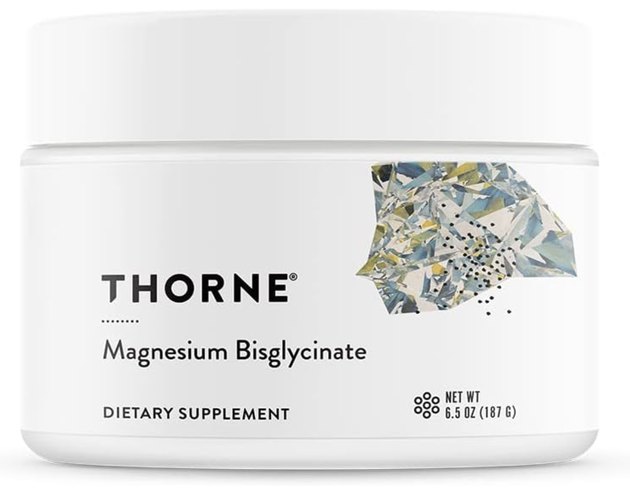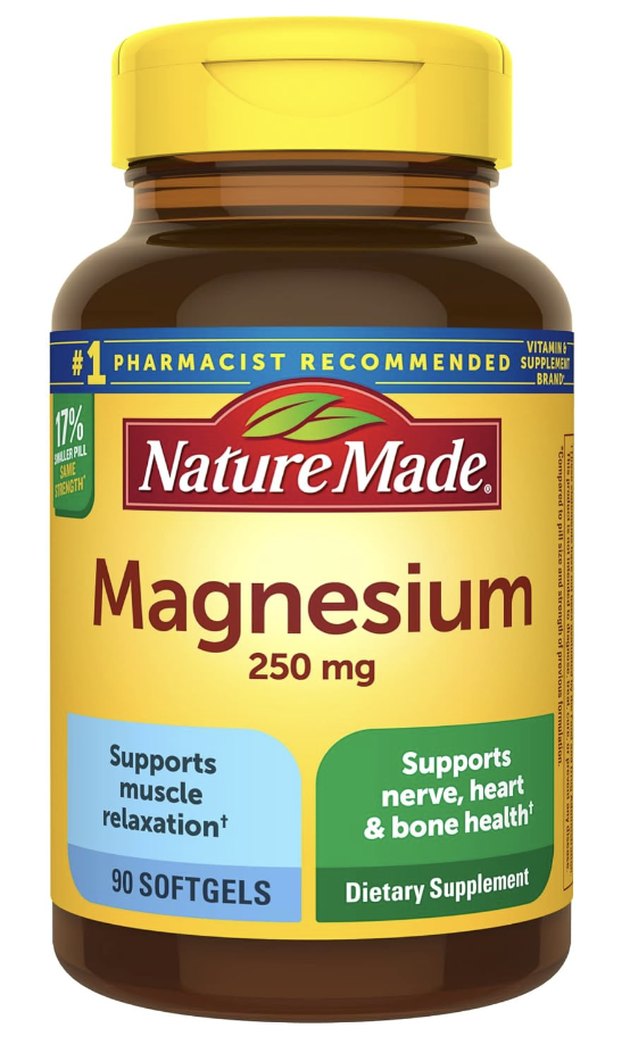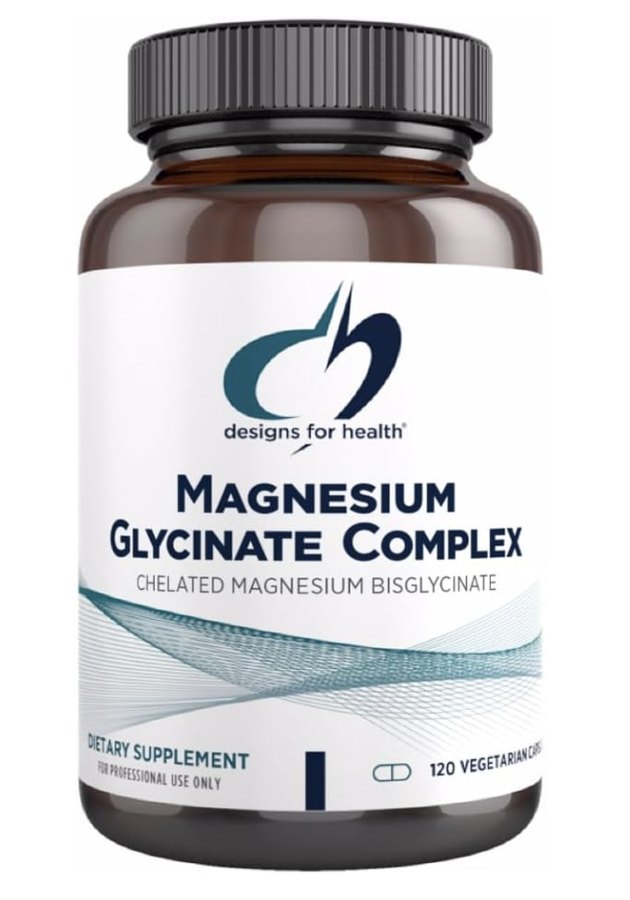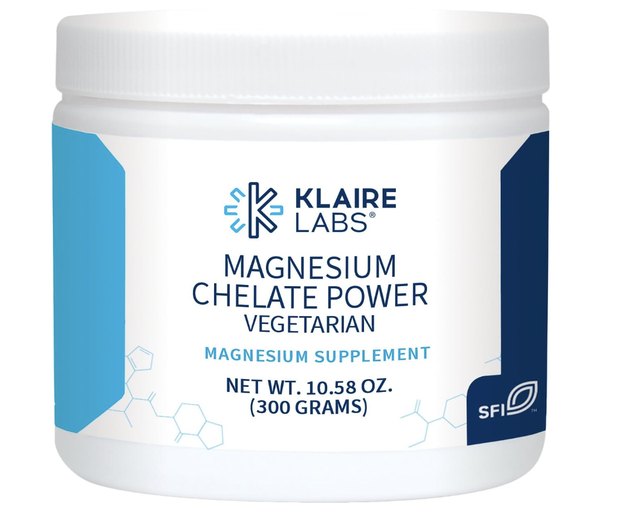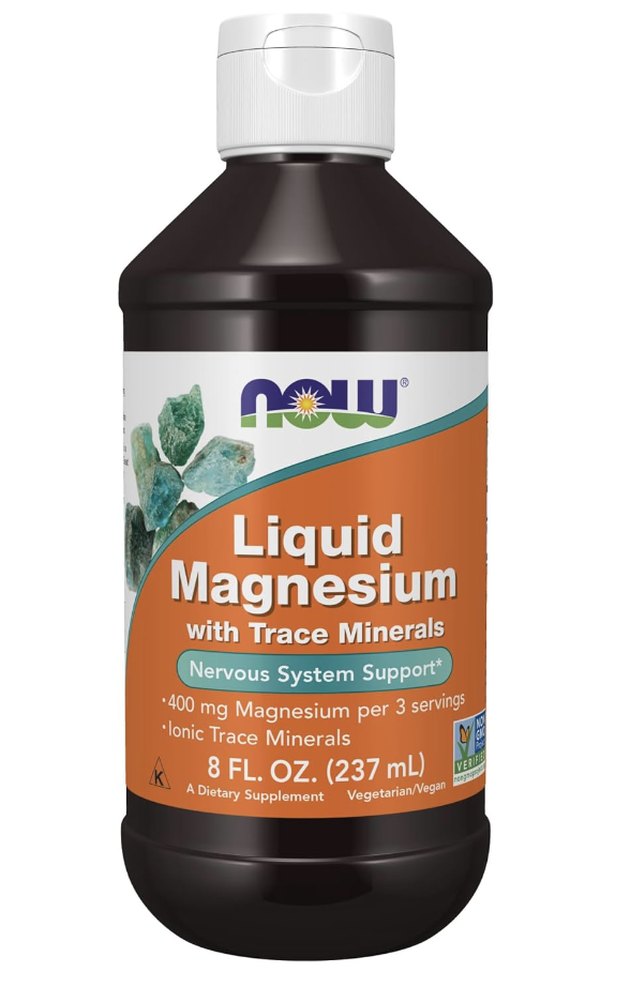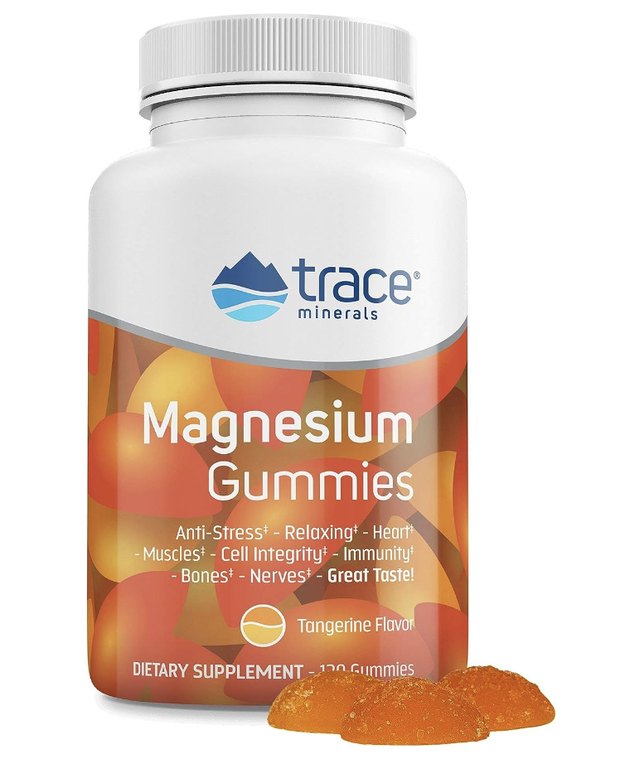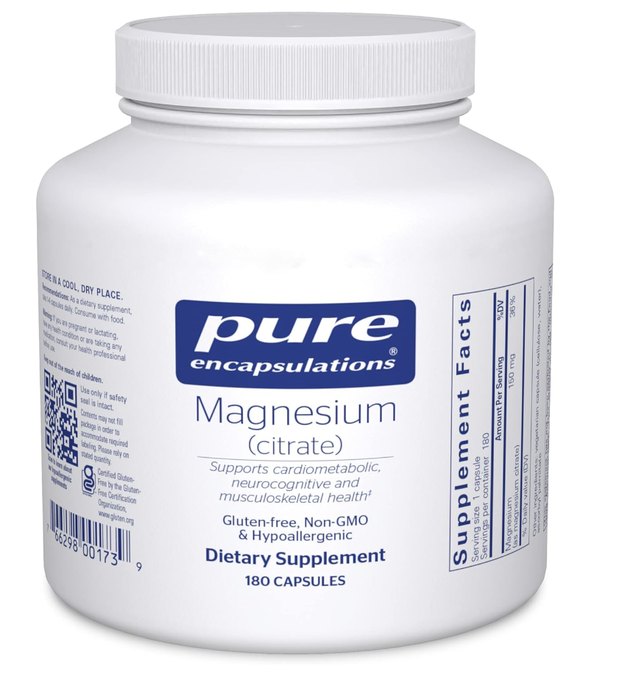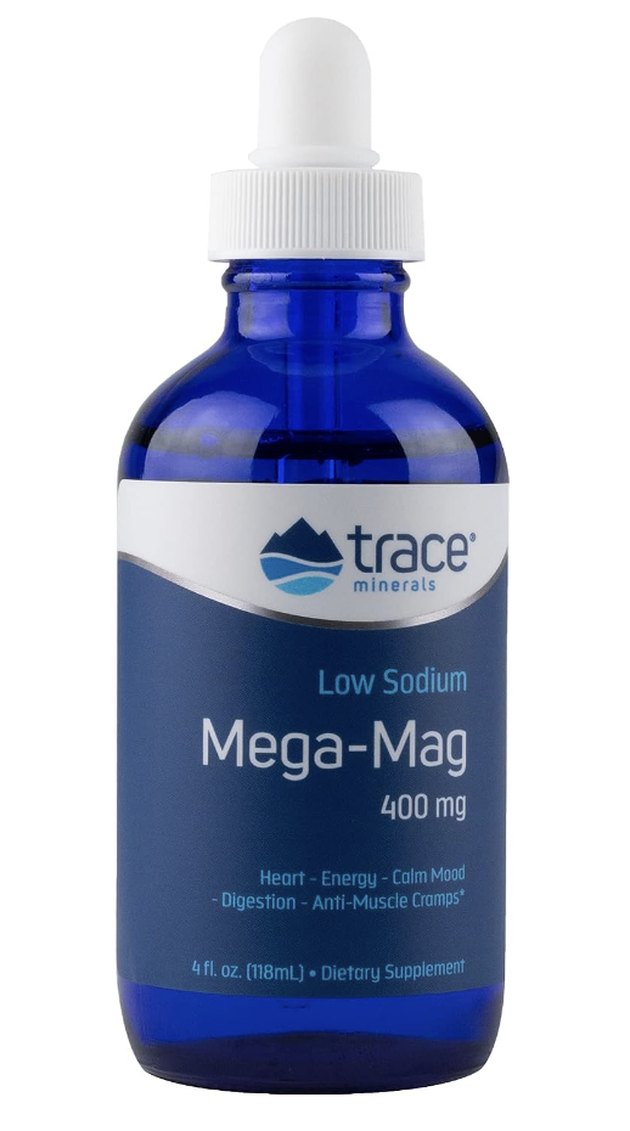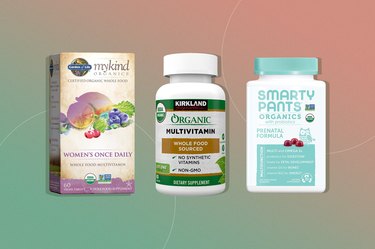
Your body needs magnesium (a mineral) to function properly. It's found in many foods, both naturally and through fortification — but if you're like most people in the U.S., what you eat isn't supplying enough of this nutrient, according to the National Institutes of Health (NIH).
That matters because magnesium supports so many of your body's tasks, such as blood pressure regulation and helping muscles contract. It also "supports the function of vital tissues in the cornea, lens and retina," says Bradley Katz, MD, PhD, a professor at the University of Utah Medical Center and CEO of Axon Optics.
Video of the Day
Video of the Day
Over the long run, a lack of magnesium can become a magnesium deficiency, which can cause symptoms like nausea, fatigue, weakness and loss of appetite, per the NIH. And, low levels over time can up the risk of chronic conditions like type 2 diabetes, high blood pressure and osteoporosis, according to the NIH.
If you're not getting enough magnesium from food — or if you have a medical condition that affects your body's ability to absorb the mineral — taking supplements can help. Magnesium supplements may help with a wide array of symptoms and conditions, including headaches, muscle pain, stress management, insomnia, restless leg syndrome and fibromyalgia, says Sheetal DeCaria, MD, an integrative physician in Illinois.
Magnesium is available in many forms, but the most commonly used ones are below. Note that some of these forms of magnesium are primarily used to treat constipation, while others are better for repleting low magnesium stores:
- Magnesium citrate: This type is affordable and easily absorbed, and is often used to treat constipation, says dietitian Rachel Werkheiser, RD of the hospitality group Sodexo Healthcare.
- Magnesium oxide: You may know this better as milk of magnesia. While it doesn't absorb well, it's "often used for short-term relief of digestive issues including indigestion and constipation," Werkheiser says.
- Magnesium chloride: This well-absorbed option is often used to treat low magnesium levels, Werkheiser says.
- Magnesium sulfate: You likely know this better as Epsom salt, the product you add to the bath to soothe achy and sore muscles, Werkheiser points out.
- Magnesium glycinate: Another option that absorbs well, Werkheisererk says. Magnesium glycinate benefits include a potential reduction in anxiety, depression and insomnia — but more research is needed. It has few side effects and is gentle on the stomach, Dr. Katz notes.
- Magnesium malate: This variety doesn't have a laxative effect, per the American Association for the Study of Liver Diseases. And it may absorb well, per a small February 2018 study in the Journal of the American College of Nutrition, which compared a placebo to a supplement of magnesium malate combined with vitamins B6, B12 and folate.
Which Form of Magnesium Is Best Absorbed?
When it comes to magnesium, look to food first. “Food is definitely the best way to get the necessary magnesium,” Dr. DeCaria says.
Magnesium-rich foods include leafy greens, some nuts and seeds, brown rice and avocado. Your body can only absorb about 30 to 40 percent of the magnesium you take in from food, per the NIH. People who are older, have GI diseases or have type 2 diabetes may not absorb magnesium as well or might lose some via urine.
If you cannot or do not eat foods with magnesium or have a shortfall for other reasons, supplements can help. The best-absorbed magnesium forms are citrate and glycinate, Shapiro says.
Dissolvable forms of magnesium — such as effervescent tablets — may absorb better, Werkheiser says.
The Best Magnesium Supplements
- Best Overall: Thorne Magnesium Bisglycinate ($43.20, Amazon)
- Best Budget: Nature Made Magnesium 250 mg Liquid Softgel ($9.99, Amazon)
- Best for Sleep: Designs for Health Magnesium Buffered Chelate ($34.19, Amazon)
- Best Powder: Klaire Labs Magnesium Chelate Powder ($44.99, Amazon)
- Best Liquid: NOW Supplements Liquid Magnesium ($13.45, Amazon)
- Best Gummy: Trace Minerals Magnesium Gummies ($19.79, Amazon)
- Best for Constipation: Pure Encapsulations Magnesium ($33.20, Amazon)
- Best for Magnesium Deficiency: Trace Minerals Mega Mag ($16.19, Amazon)
How We Chose
The vitamin aisle can be a sketchy location, with overreaching claims emblazoned across packaging. This is possible because, despite their health claims, supplement safety and efficacy aren't approved by the FDA. The organization does set Current Good Manufacturing Practices (CGMPs), which include requirements for preparation and storage.
To ensure that only reputable vitamins are included on this list, we consulted with experts, including doctors and registered dietitians. We also reviewed research to assess the potential health benefits of magnesium supplementation, separating hype from science-backed info.
Finally, we looked for products with CGMPs compliance or verification from one of the three main independent quality control groups that test and review supplements:
For more information on how we choose and cover products, click here.
Tip
If you're being treated for a medical condition or are prescribed medication, check with your doctor before adding a magnesium supplement to your routine.
1. Thorne Magnesium Bisglycinate
Thorne makes a high-quality supplement, says Tim DiLeo, RD with Sodexo, a certified specialist in sports dietetics and an ISAK-certified anthropometrist. His assessment is backed by the powder's NSF certification.
The supplement is free from gluten, dairy, soy and artificial flavors. "[The] powder mixes well and has a lightly sweetened taste from monk fruit," DiLeo says. To take this supplement, you'll mix a scoop with 8 ounces of water (or more).
2. Nature Made Magnesium Liquid Softgel
Nature Made is often a top-recommended vitamin brand. The company "has a long history of making safe, high-quality products," DiLeo says. The product is third-party certified by USP.
Being in liquid form could help increase absorption (even in capsule form), DiLeo notes. That said, note that the form of magnesium in this pill — magnesium oxide — is not known for its absorption. As well as treating low levels of magnesium, this form of the mineral is often used to treat indigestion or help you go if you're constipated, per St. Luke's, a nonprofit health system.
3. Designs for Health Magnesium Buffered Chelate
More research is needed, but there are indications that magnesium can help you fall asleep and also achieve better sleep quality, per a November 2021 study in Sleep.
Designs for Health is one of the brands that Dr. DeCaria approves, noting that it provides reputable and high-quality products. The company adheres to the FDA's good manufacturing practices.
It's made of chelated magnesium glycinate, which is well-absorbed and made with the amino acid glycine, which is linked to better sleep.
4. Klaire Labs Magnesium Chelate Powder
This option is made using magnesium bisglycinate, which is one of the well-tolerated forms, causing few GI-related side effects.
Klaire Labs follows CGMP regulations. This powder is free from sweeteners, as well as artificial colors, flavors and preservatives.
5. NOW Liquid Magnesium With Trace Minerals
This liquid form of magnesium comes recommended by Amy Shapiro, RD, CDN, founder of Real Nutrition. Because it's a liquid, it may be better absorbed into your body and it's generally well-tolerated, DiLeo says.
The supplement is NPA-certified. "I trust their products unconditionally," Shapiro says. She also appreciates the addition of trace minerals. "So many water sources are void of trace minerals, which help with hydration," she says.
6. Trace Minerals Magnesium Gummies
If taking a pill or powder is not your thing, trying a magnesium gummy like this one from Trace Minerals may be a good choice. Sweetened with tapioca powder and cane sugar, these tangerine-flavored gummies are tasty and easy to chew. Plus they are vegan and gluten-free.
One downside? They have a bit less magnesium per gummy than the average capsule does — about 84 milligrams, or 20 percent of your daily value. This means you may have to take multiple each time, in order to meet your needs.
7. Pure Encapsulations Magnesium (Citrate)
Shapiro describes Pure Encapsulation as one of her "best overall, trusted brands." Pure Encapsulations is NSF-GMP certified.
Shapiro recommends this supplement if you're looking to relieve constipation. It's made with magnesium citrate, which is an easily absorbed form. This supplement does not have artificial colors, flavors or sweeteners, and it also does not have wheat, eggs, nuts or gluten.
8. Trace Minerals Mega Mag
If your blood work shows that you're magnesium deficient, and your doctor gives you the OK to try supplements, this potent liquid from Trace Minerals may help increase your levels. Each serving has about 400 milligrams of magnesium, plus trace amounts of chloride, sodium (only 5 milligrams), potassium, sulfate and boron — all essential minerals your body needs.
The minerals in this product are from Utah's Salt Lake water, and are processed in a CGMP-registered facility. Plus, it's gluten-free and vegan.
Some things to keep in mind: You may have to take multiple droppers per day to meet your needs, and the taste is not ideal. But you can try mixing it with water, coffee or juice.
What About Magnesium for Leg Cramps?
First, the bad news: While low levels of magnesium — along with other electrolytes — may be a contributing factor to leg cramps, according to the Cleveland Clinic, supplementing isn't necessarily a helpful remedy.
"Research does not support success treating leg cramps with magnesium," Shapiro says.
That said, if you're willing to try anything to relieve the discomfort from cramps, Shapiro recommends taking a version with magnesium citrate, which absorbs well, such as Pure Encapsulations Magnesium Citrate.
What to Look for in a Supplement
No prescription is required for supplements, but it's always wise to talk with a doctor before taking them. "Although magnesium supplements are widely considered safe, they can interfere with certain medications and pose health risks at high doses," Werkheiser says.
Plus, you'll want to make sure you're taking the right form — a doctor or dietitian can help. "Some forms of magnesium like oxide and citrate help with regularity and some help with central nervous system regulation," Shapiro says. Choosing the one that's right for your needs can help you avoid side effects.
Here are other considerations to keep in mind while selecting a magnesium supplement:
Quality
Not all supplements follow the same standards, from manufacturing through to advertisements. Look for well-regarded brands (this list of the top vitamin brands is a good starting place).
"Be sure to choose brands with a U.S. Pharmacopeia (USP) seal, which means that the supplement has been independently verified for quality and potency," Werkheiser says. (More on third-party certification in a moment.)
Dietary Restrictions
Always check the ingredient list if you have a food allergy, food intolerance or simply prefer to avoid certain ingredients. Sometimes supplements may have no-go ingredients given your circumstances — someone with celiac disease, for instance, will want to avoid products that have gluten.
Supplements can also have a surprising amount of sugar, as in sweet chewable or gummy vitamins.
Filler Ingredients
Taking a look at the ingredient list can help reveal any fillers that are used, too, Shapiro says. These ingredients are used to help bulk out the supplement, help keep it stable or help prevent moisture, vitamin-maker Thorne points out.
Some fillers may be ingredients that you'd prefer to avoid, although ConsumerLab notes that these inactive ingredients are FDA-regulated.
Dosage
Always check the dosage, Dr. Katz says. "Excessive levels of magnesium in the body can have negative side effects." For adults, the upper limit of magnesium is 350 milligrams, per the NIH.
Taking too much can lead to diarrhea, nausea and stomach cramping, according to the NIH. And, if you take extremely high amounts, it could even cause cardiac arrest.
"Look for supplements with smaller doses of magnesium (100 to 240 milligrams per serving) as these tend to be absorbed better than very large amounts at one time," DiLeo says.
Third-Party Certification
In an unregulated space, certification verifies a product has what it says it does.
"This identifies to the consumer that the product is free of banned substances/hidden ingredients and that the label is accurate (ingredients list and their doses)," DiLeo says.
Safety Concerns
Taking too much magnesium can lead to unpleasant, and potentially dangerous, side effects. Plus, this supplement can interact with other medications — antibiotics, for instance, shouldn't be taken right before or right after you take magnesium, per the NIH.
- Office of Dietary Supplements: "Magnesium Fact Sheet for Health Professionals"
- ODS: "Magnesium Fact Sheet for Consumers"
- American Association for the Study of Liver Diseases: "The Best Magnesium Supplements"
- Journal of the American College of Nutrition: "Scottsdale Magnesium Study: Absorption, Cellular Uptake, and Clinical Effectiveness of a Timed-Release Magnesium Supplement in a Standard Adult Clinical Population"
- FDA: "FDA 101: Dietary Supplements"
- FDA: "Current Good Manufacturing Practices (CGMPs) for Dietary Supplements"
- NSF: "Dietary Supplements Claims, Labels and Regulations"
- Consumer Lab: "Brands Tested"
- USP: "USP Verified Mark"
- St. Luke's: "magnesium oxide"
- Cleveland Clinic: "Muscle Spasms"
- Consumer Lab: "Magnesium Supplements Review (Including Calcium, Vitamins D & K, and Boron)"
- Cleveland Clinic: "Does Magnesium Help You Sleep?"
- Thorne: "What Actually Are Those “Other Ingredients” on a Thorne Product Label?"
- Consumer Lab: "Inactive Ingredients / Excipients in Supplements Review Article"
- Axonoptics: "Bradley J. Katz, MD, PhD"
